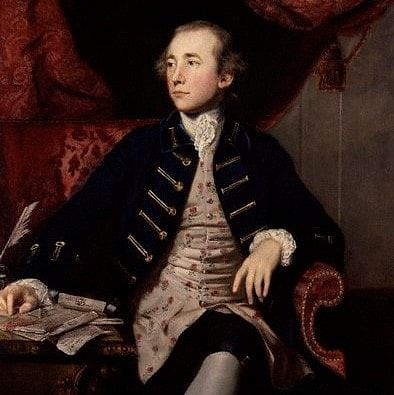SSC CGL Exam > SSC CGL Notes > SSC CGL Tier 2 - Study Material, Online Tests, Previous Year > Warren Hastings 1732-1818
Warren Hastings 1732-1818 | SSC CGL Tier 2 - Study Material, Online Tests, Previous Year PDF Download
| Table of contents |

|
| INTRODUCTION |

|
| ABOLITION OF THE DUAL SYSTEM |

|
| REVENUE REFORMS |

|
| JUDICIAL REFORMS |

|
| TRADE REGULATIONS |

|
INTRODUCTION

Warren Hasting (1732 - 1818)
- He started his career as a writer (clerk) in the East India Company at Calcutta in 1750.
- In 1758, he became the British resident at Murshidabad, the capital of Bengal, after Mir Jafar was installed as the Nawab after the Battle of Plassey.
- During his term, the First Anglo-Maratha war and the second Anglo-Mysore war were fought.
- The Regulating Act of 1773 was passed during his term.
- He supported Sir William Jones in the formation of the Asiatic Society of Bengal in 1785.
ABOLITION OF THE DUAL SYSTEM
- Hastings abolished the Dual System that had been established by Robert Clive. In the Dual System, the company had Diwani rights (rights to collect revenue) and the Nizam or Indian chiefs had the administrative authority.
- The Nawab’s annual allowance of Rs.32 lakh was reduced to Rs.16 lakh.
- The annual tribute paid to the Mughal Emperor was also stopped.
REVENUE REFORMS
- For revenue collection, a Board of Revenue was set up at Calcutta.
- Treasury was moved from Murshidabad to Calcutta. Calcutta became Bengal’s capital in 1772.
- British collectors were appointed for each district and an Accountant General was also appointed.
- Unreasonable fines were done away with and restrictions were placed on the raising of rent.
JUDICIAL REFORMS
- The judicial powers of the Zamindars were abolished.
- Civil and criminal courts were established. Two appellate courts were established at Calcutta, one for civil (Sadar Diwani Adalat) and one for criminal (Sadar Nizamat Adalat) cases.
- The criminal court was to have an Indian judge.
- Muslims were to be tried according to their law in the Koran and Hindus, according to Hindu laws. A code of Hindu Law, prepared by Hindu Pandits was translated into English.
- He also came down heavily on the dacoits in Bengal.
TRADE REGULATIONS
- Hastings abolished the system of dastaks which were misused by company officials and traders earlier.
- He enforced a uniform tariff of 2.5% for Indian and foreign goods.
- Private trade by company officials was restricted.
The document Warren Hastings 1732-1818 | SSC CGL Tier 2 - Study Material, Online Tests, Previous Year is a part of the SSC CGL Course SSC CGL Tier 2 - Study Material, Online Tests, Previous Year.
All you need of SSC CGL at this link: SSC CGL
|
1365 videos|1312 docs|1010 tests
|
FAQs on Warren Hastings 1732-1818 - SSC CGL Tier 2 - Study Material, Online Tests, Previous Year
| 1. Who was Warren Hastings and what is his significance in history? |  |
Warren Hastings was a British colonial administrator who served as the first Governor-General of Bengal from 1772 to 1785. He played a crucial role in British colonial rule in India and implemented several administrative reforms. His significance lies in his efforts to establish a more efficient and centralized administration in British India.
| 2. What were the major reforms implemented by Warren Hastings during his tenure as Governor-General of Bengal? |  |
During his tenure, Warren Hastings implemented various important reforms. Some of the major ones include:
- The establishment of a judicial system based on English common law, known as the Cornwallis Code.
- The introduction of the Permanent Settlement, a revenue system that aimed to stabilize land revenue and provide landlords with hereditary rights over the land.
- The creation of the Civil Service to ensure a professional and merit-based administration.
- The abolition of the system of dual government, which had allowed the East India Company and the Mughal Emperor to share power.
| 3. How did Warren Hastings handle the political and military challenges during his time as Governor-General? |  |
Warren Hastings faced various political and military challenges during his tenure. He successfully navigated conflicts with local rulers, such as the Rohilla War and the Maratha Wars, by employing diplomacy and military strategies. He also sought to establish alliances with native rulers and reduce the influence of external powers, such as the French, in the region. His policies aimed to consolidate British power and expand their territorial control in India.
| 4. What were the controversies surrounding Warren Hastings' impeachment trial? |  |
Warren Hastings' impeachment trial was a major political event that lasted from 1787 to 1795. He faced charges of corruption, bribery, and committing atrocities during his time as Governor-General. The trial was highly controversial, with political factions divided over his guilt or innocence. Ultimately, Hastings was acquitted of most charges, but the trial highlighted the growing scrutiny and criticism of British colonial rule in India.
| 5. What was the impact of Warren Hastings' tenure as Governor-General on British colonial rule in India? |  |
Warren Hastings' tenure as Governor-General had a significant impact on British colonial rule in India. His reforms laid the foundation for a more centralized and efficient administration, which would be further developed by his successors. His policies also contributed to the consolidation of British power in India and set the stage for future expansion and control over Indian territories. However, his tenure also raised questions about the ethics and practices of British colonialism, as highlighted by his impeachment trial.
|
1365 videos|1312 docs|1010 tests
|
Download as PDF

|
Explore Courses for SSC CGL exam
|

|
Signup for Free!
Signup to see your scores go up within 7 days! Learn & Practice with 1000+ FREE Notes, Videos & Tests.
Related Searches


















